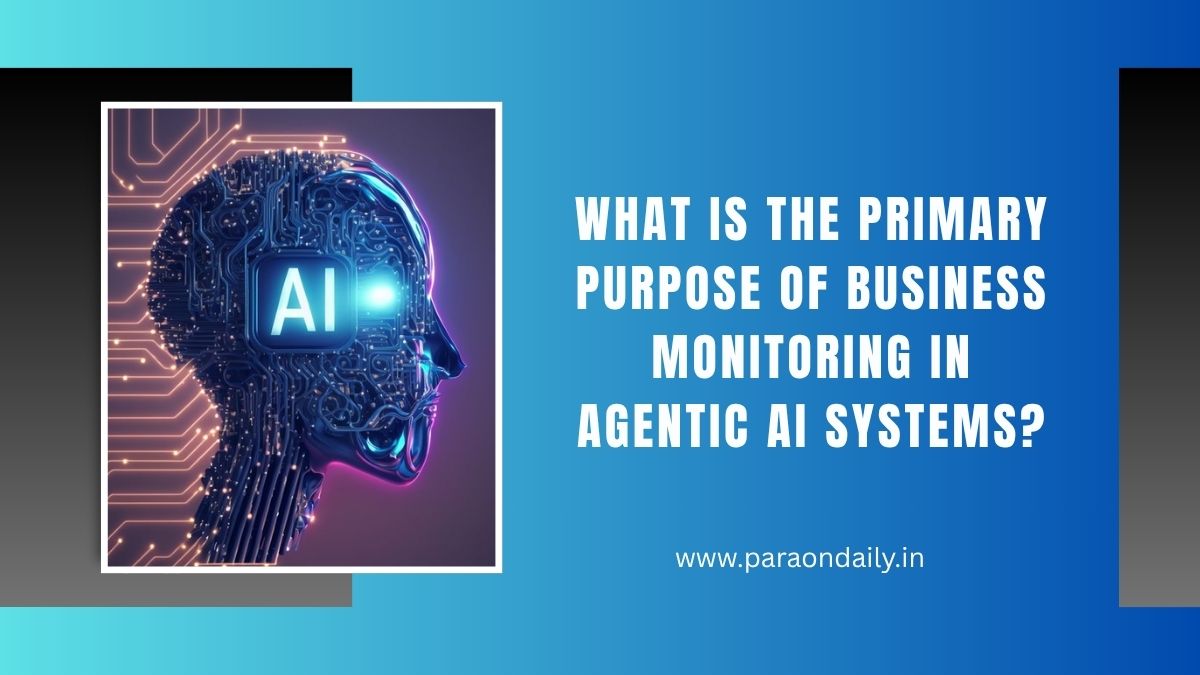In today’s fast-changing digital world, artificial intelligence (AI) has become one of the most powerful tools for improving how businesses work. Among the different types of AI, agentic AI systems are gaining special attention because they can make decisions and take actions on their own. But as these intelligent systems work independently, it becomes very important to track what they are doing and how they are performing. This is where business monitoring comes in.
Understanding what is the primary purpose of business monitoring in agentic AI systems? helps us see why constant observation, analysis, and control are necessary for accuracy, efficiency, and safety in business operations. Let us explore this topic in simple words.
Understanding Agentic AI Systems
Before discussing business monitoring, it is important to know what agentic AI systems are. These are AI systems that act as agents — meaning they can analyze information, make decisions, and perform tasks with little or no human help. For example, an AI system in a company might handle customer support, analyze market data, or even manage supply chains.
Agentic AI systems are designed to think logically, learn from experience, and adapt to changes. They can plan, reason, and interact with other systems. Because they can work independently, they are very useful in modern business environments where speed and accuracy matter most.
However, independence also brings risks. Without proper monitoring, an agentic AI might make decisions that are wrong, biased, or harmful to the business. This is why business monitoring plays such a vital role.
Also read: What Factor Impacts a Change in the Quantity of a Product or Service?
Meaning of Business Monitoring in AI
Business monitoring means keeping track of business processes, decisions, and performance to make sure everything runs smoothly. In the case of AI, it refers to observing how the system behaves, what data it uses, and what kind of results it produces.
In simple words, business monitoring in agentic AI systems means keeping an eye on the AI’s actions to ensure that it aligns with the company’s goals and ethical standards. It helps detect mistakes, prevents misuse of data, and ensures transparency.
Monitoring is not about stopping the AI from working independently — it is about guiding it to work effectively and safely.
What Is the Primary Purpose of Business Monitoring in Agentic AI Systems?
The primary purpose of business monitoring in agentic AI systems is to ensure accuracy, accountability, and alignment between the AI’s activities and the organization’s business goals. In other words, monitoring ensures that AI systems make correct decisions, follow company policies, and operate within safe boundaries.
Let’s explore the main purposes of business monitoring in detail.
1. Ensuring Accuracy and Performance
The first and most important reason for business monitoring is to make sure that the AI system works correctly. Agentic AI systems handle large amounts of data, and even a small mistake in that data can lead to wrong results.
Monitoring helps identify these errors early. For example, if an AI system is predicting sales trends, business monitoring ensures that the predictions are accurate and based on real data. If something goes wrong, the system can be corrected quickly.
By tracking performance, businesses can also measure how effective the AI is — whether it is improving efficiency, reducing costs, or achieving desired goals.
2. Maintaining Accountability
One of the challenges with agentic AI is that it makes independent decisions. Without proper tracking, it can be hard to know who or what is responsible for a particular outcome.
Business monitoring provides a clear record of the AI’s decisions and actions. This transparency helps in identifying which part of the system made a decision and why.
In case of errors or unexpected behavior, businesses can review these records to understand what happened. This ensures accountability, both for the AI system and the team that manages it.
3. Detecting Risks and Preventing Failures
Another major purpose of business monitoring is risk detection. Agentic AI systems can sometimes behave unpredictably if they face new or confusing data. If not monitored, these errors can lead to financial loss or even damage a company’s reputation.
Monitoring helps spot such risks early. For instance, if an AI system managing online transactions starts showing strange patterns, monitoring tools can alert the team immediately. This allows quick action before any major damage happens.
Regular monitoring acts like a safety net, protecting businesses from technical, ethical, or financial risks.
4. Improving Decision-Making
Business monitoring provides valuable data about how well the AI system performs. This data helps business leaders make smarter decisions.
For example, if the monitoring reports show that certain AI tasks are producing better results, the company can invest more in those areas. Similarly, if a process is underperforming, adjustments can be made quickly.
By combining AI’s analytical power with human judgment, organizations can reach better business outcomes. Monitoring ensures that decisions are based on facts, not assumptions.
5. Ensuring Compliance and Ethical Use
In modern businesses, following legal and ethical guidelines is extremely important. AI systems must not misuse data or make biased decisions. Business monitoring ensures that the AI operates fairly and within legal limits.
For example, if an AI system is used in hiring employees, monitoring ensures that it does not discriminate based on gender, race, or age. Similarly, in financial services, monitoring ensures that data privacy rules are followed.
This promotes trust and transparency — two qualities every business needs to build a good reputation.
6. Supporting Continuous Improvement
Monitoring does not just detect problems; it also helps in making improvements. When businesses study AI performance data regularly, they learn where the system can be optimized.
For instance, if an AI-powered chatbot is taking too long to respond to customers, monitoring can help identify why. The system can then be updated to respond faster and more accurately.
Continuous monitoring ensures that the AI system keeps learning and improving, just like a human employee who gets better with experience.
7. Enhancing Security
Agentic AI systems often handle sensitive information such as customer details, financial data, and business strategies. Without proper security monitoring, this data could be misused or stolen.
Business monitoring helps detect unusual activities or cyber threats in real time. If an AI system is accessed by an unauthorized user or starts sending data to unknown sources, the monitoring system can block it immediately.
Thus, monitoring plays a key role in protecting both the business and its customers from data breaches and other digital threats.
8. Managing Resources Efficiently
Monitoring helps businesses use their resources — such as time, money, and technology — more effectively. By tracking performance, companies can identify which AI processes are saving time and which ones are consuming too many resources.
This allows management to allocate resources wisely and improve overall productivity. Efficient monitoring ensures that AI systems add real value to the business instead of increasing unnecessary costs.
9. Building Trust Between Humans and AI
For AI systems to be successful, people must trust them. Business monitoring builds that trust by making AI operations transparent.
When employees and managers know that the system is being watched carefully, they feel more confident in using it. It also helps customers feel safer when they know that the company’s AI tools are monitored to prevent errors or bias.
In short, monitoring strengthens the partnership between humans and AI — creating a balanced and reliable business environment.
10. Helping in Strategic Planning
Finally, business monitoring in agentic AI systems supports long-term planning. The data collected through monitoring helps businesses understand trends, patterns, and customer behaviors.
These insights can be used to plan new products, improve services, or expand into new markets. Monitoring provides a clear view of how the business is performing now and what changes are needed for future success.
Also read: What Factor Impacts a Change in the Quantity of a Product or Service?
Conclusion
In summary, understanding what is the primary purpose of business monitoring in agentic AI systems? reveals how important it is to balance automation with control. The main goal of monitoring is to ensure that AI systems perform accurately, ethically, and safely while aligning with business objectives. It helps detect risks, maintain accountability, improve decision-making, and promote continuous learning. By observing AI behavior regularly, businesses can prevent errors, protect data, and gain customer trust. In a world where artificial intelligence is becoming part of every industry, effective business monitoring is not just a safety measure — it is the foundation for long-term success and responsible innovation.

